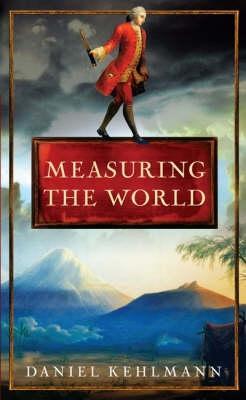 Measuring the World
Measuring the World Daniel Kehlmann
Translated by Carol Brown Janeway (German)
Originally 2005, I read 2007 Quercus hardcover
259 pages, historical fiction
Found: used at Kolkata Book Fair 2015
Alexander von Humboldt is an obsessive, highly trained all-around scientist who constantly measures, observes, and records all kinds of data. He sets off for South America with the goal of discovering the inland connection between the Orinoco and Amazon rivers, observing air pressures at different altitudes, and determining whether the earth is really made up of water. All of this is described in letters to his brother, a high-ranking politician in Germany, which are published in the newspapers.
Carl Friedrich Gauss has an innate capacity for numbers that allows him to make the greatest mathematical discoveries since Newton, in fields ranging from algebra to geodesy to astronomy. Unfortunately, he is also an ass to those around him, especially when he feels they think too slowly to keep up with him.
Alternating between the stories of these two men, Kehlmann tells an ironic, drily humorous story that is as much about science as it is about interpersonal relationships and learned German society in the early 19th century.
The Man of Science as Emotionless Beast
Like many other authors and television shows (Big Bang Theory, anyone?), this novel depicts these two highly intelligent men as emotionally distant, often rude jerks. Humboldt, for example, often treats his good friend and traveling companion Aime Bonpland as a servant, refusing to take breaks from their adventure even when he is ill. In fact, Humboldt shows more affection for a stray dog that he adopts than he does for any of the people around him. Like Sheldon Cooper on The Big Bang Theory, this is often played for laughs - but I didn't find it amusing. I felt rather sorry for Humboldt, who seems to have several mental disorders, not to mention his seemingly repressed homosexuality.
Gauss is even worse than Humboldt in this respect. He has no patience for anyone who thinks more slowly than he does, and he never censors his words. When Gauss finally finds a woman who can keep up with him mentally, he quickly loses interest in her as well. Even after their marriage, he continues to sleep with a prostitute and misses all of the major events of his wife's life, including every time she gives birth. Worst of all, he is incredibly abusive towards his son, who is not mathematically inclined but does have an emotional intelligence that his father is entirely lacking.
I know that Kehlmann is trying to demonstrate the problem with putting mathematical knowledge on a pedestal compared with all other ways of relating to world, and I greatly appreciate this message. I just did not appreciate the way he went about conveying it. Neither of these men are someone that I would want to meet in real life, and I didn’t enjoy reading about them either - especially because the opposite viewpoint is never really given a chance to show itself.
A Bestseller
This novel is apparently a huge bestseller in Germany and many other places. I don't quite see the appeal. Similar to F, Kehlmann’s novel that I reviewed for the IFFP shadow panel earlier this year, this novel seemed amusing but rather superficial. Does Kehlmann actually explore the problems with his characters’ emotional development? Nope. While there is a lot of dry humor and implied criticism of the way Humboldt and Gauss approach life, there was little to no explicit character development. This left me bored and unsatisfied, despite the occasional moments of amusement.
If you like historical fiction, particularly about men of science, you may enjoy this book. If you’re looking for psychological complexity, steer clear.
Measuring the World is available in the US from Amazon and indiebound, in the UK from Amazon and Hive, in India from Amazon and flipkart, and worldwide from Wordery and the Book Depository.
No comments:
Post a Comment